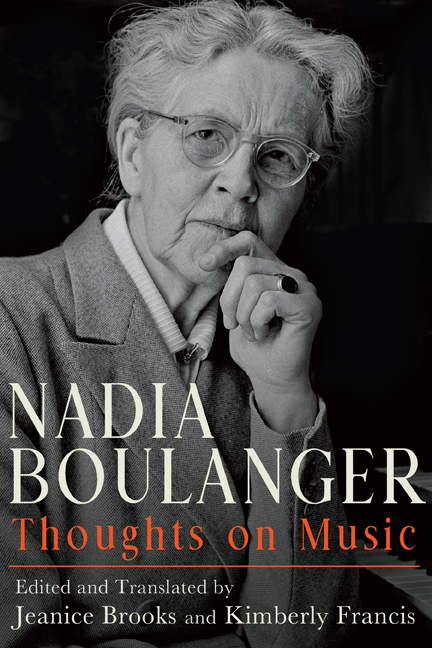Book contents
- Frontmatter
- Contents
- List of Illustrations
- Acknowledgments
- Editorial Apparatus and Critical Notes
- Note on Translations
- List of Abbreviations
- Timeline of Nadia Boulanger’s Life
- Introduction
- Part One Journalism, Criticism, Tributes
- Part Two Lectures, Classes, Broadcasts
- Bibliography of Nadia Boulanger’s Published Writing
- General Bibliography
- Index
“Propos Impromptus: Nadia Boulanger,” Remarks Collected by Raymond Lyon, Le Courier Musical 61 (1978): 5-8 (complete text)
Published online by Cambridge University Press: 15 October 2020
- Frontmatter
- Contents
- List of Illustrations
- Acknowledgments
- Editorial Apparatus and Critical Notes
- Note on Translations
- List of Abbreviations
- Timeline of Nadia Boulanger’s Life
- Introduction
- Part One Journalism, Criticism, Tributes
- Part Two Lectures, Classes, Broadcasts
- Bibliography of Nadia Boulanger’s Published Writing
- General Bibliography
- Index
Summary
In the fifty-fifth issue of Le Courrier musical de France, concerning musical relations between the United States and France, we brought to light the fundamental role played by Nadia Boulanger, “a role that is far from being finished,” and we cited some of those among the greatest names in American music who came to Paris or to the Conservatoire at Fontainebleau to develop their own gifts in the light of Nadia Boulanger's teaching.
The announcement that we published a little later, at the top of no 58's “News” section, about the gold medal [médaille d’or] that she had just received from the Académie des Beaux-Arts, also paid homage to the marvelous teacher whose influence, it is true, has at the present time eclipsed her gifts as a composer and her talent as a pianist or conductor.
Nadia Boulanger welcomed us in her home; she has lived for a very long time at the bottom of the Montmartre hill, in a large, quiet apartment, bathed in a discreet light where the walls are lost in shadow, allowing one to see only the paintings, the furniture, the objects, calls to memory, apt places for meditation.
It was, in truth, an entirely meditative internal state that soon came to guide Nadia Boulanger's words—forgetting our presence, forgetting the microphone. We have not reproduced her long reflection here in its entirety, but what we have reproduced of it is faithful to the recording, and how could one not be moved and touched with admiration for such humility before the unknowable, by such love for her brethren, by such gratitude towards the beauties of Creation?
Nadia Boulanger, completely surrounded as she is by the gratitude of a hundred disciples she instructed, appears to feel that she has received much more than she has given, and she thanks God, who has given her all this.
She explains how the weakness of her eyes, from early in her childhood, guided her toward music: “I only began to learn the alphabet a year after having begun harmony: when I think, I think first in sounds.”
- Type
- Chapter
- Information
- Nadia BoulangerThoughts on Music, pp. 435 - 440Publisher: Boydell & BrewerPrint publication year: 2020

